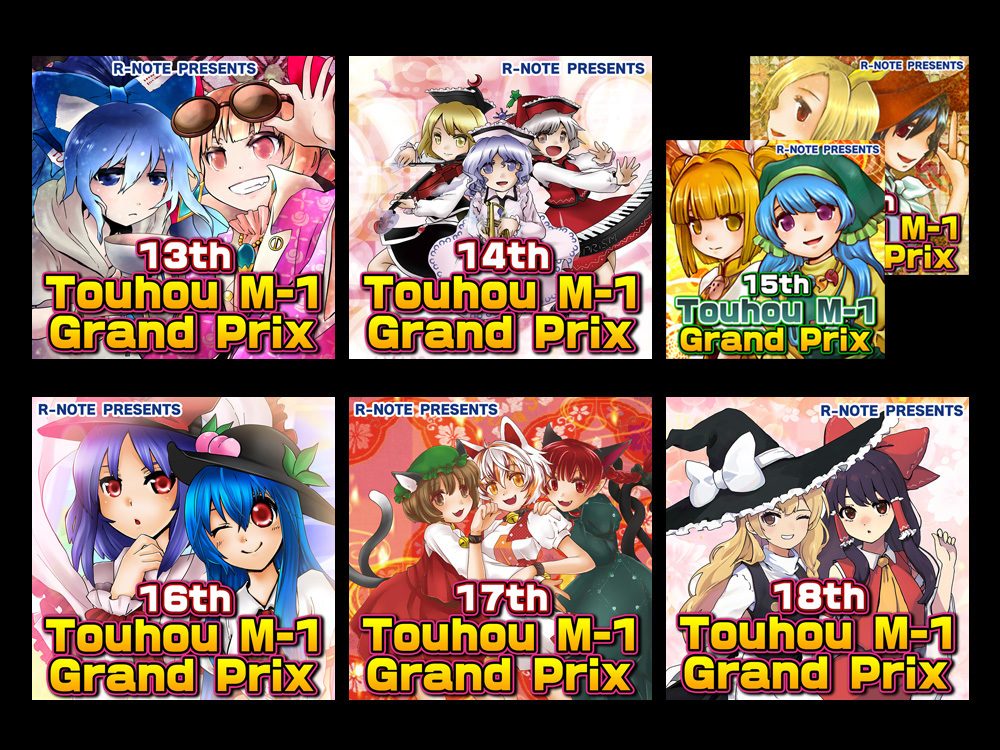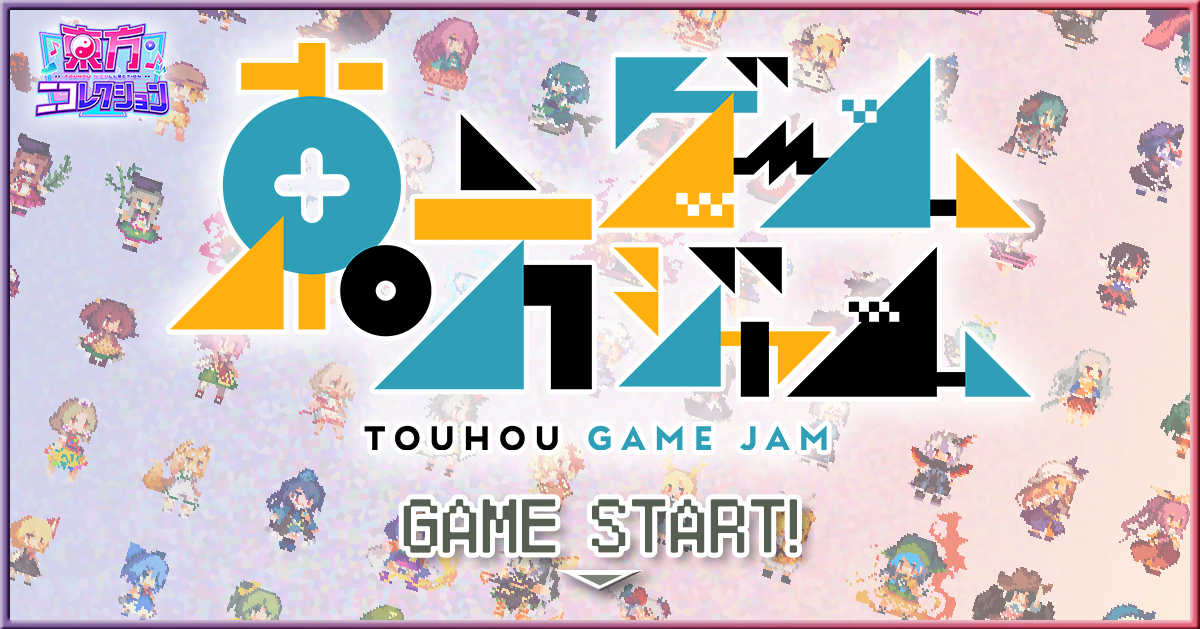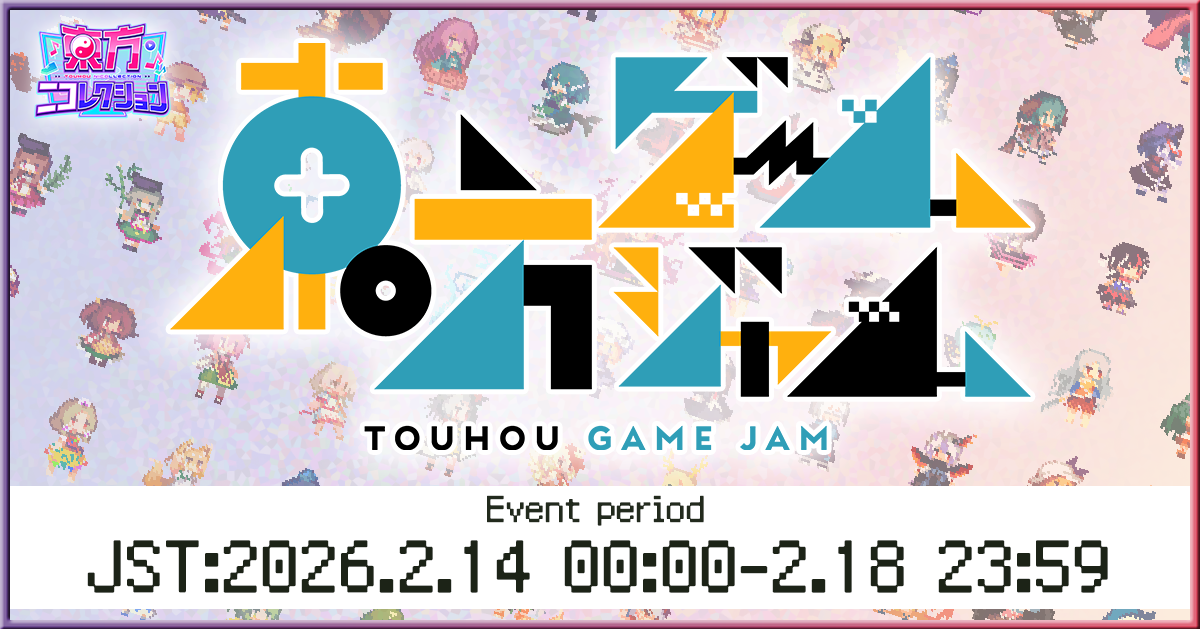Fantasy Maiden Wars: English Translation Team Interview
Short interview with the English translation team for Fantasy Maiden Wars.

After over a decade of waiting, the Super Robot Wars inspired Touhou fangame, Fantasy Maiden Wars, is getting an official English translation. To celebrate this occasion, we’ve decided to interview the English translation team to learn more about their amazing endeavor.
Introductions
To start off, let’s get to know the team better. The team consists of veterans in the industry, with over a decade of experience, either in the fandom or as a translator. Some of them even got their start in translation thanks to Touhou.
Q: Please introduce yourselves: What are your names, your role in the translation, and how did you come to know about Touhou?
CR: Hi! I’m Christina Rose, team lead and editor for the Fantasy Maiden Wars official EN translation project. I first learned about Touhou by reading a Let’s Play thread made by Something Awful forums poster Zorak many years ago, where he played through most of the original PC98 games. But I was barely acquainted with the Windows games until I started playing FMW.
AW: Hey there. I’m Azumi, co-editor and translator on this project. About 16 years ago I saw a piece of fan-art of the enormous cast of Touhou and became curious about what sort of games could possibly have such a huge cast. I ended up getting deeply into the early PC-era games and the doujin music scene as a result of that. 16 years… Time is a scary thing, isn’t it?
Clarste: Hi, I’m Clarste, the lead translator for the game. I’ve been into Touhou for about 20 years now? I think I first came across it on GameFAQs message boards. Touhou itself got me into translation, first as a hobby and then a career.
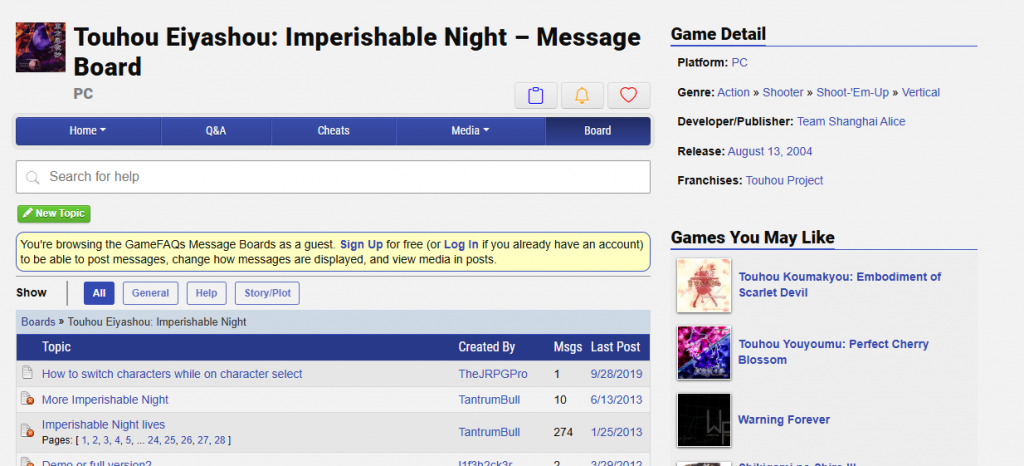
Alice: Hi hi! I’m Alice, and I came on-board later in the project to help with translating the battle lines and the database. I got into Touhou back in college around 16 years ago after getting curious about some bullet hell footage I saw online, which was when I got really into the games.
Battler: I’m Battler, I mainly handled battle lines. I came across some weird Touhou meme in a forum signature on a Fire Emblem board like ~18 years ago, and it bugged me that I didn’t recognize what anime it was from. Then when I looked up footage, I was like “oh damn it’s like Tyrian and Galaga” so I gave it a try. So I fell in love with the games first, and the world and everything else after that.
nook: Hello! I’m nook, in charge of “logistics” (whatever that means) and spot translator at times. I handled all (most) of the game’s system text. I came into Touhou through a fangame called Touhou Puppet Play (Touhoumon for short), around the time Ten Desires was coming out, so about 14 years ago.
Q: What’s your experience with Touhou, personally? Favorite character, favorite game, or anything else you especially enjoy?
CR: My favorite Touhou games are Subterranean Animism and Mountain of Faith. In terms of characters, I’m heavily partial to Sanae Kochiya—I love the bit in SA’s extra stage where she eagerly shows up as a mid-boss going, “Look, I can do a proper Gensokyo greeting now!” My favorite SA memory is a time I had to stay in a hotel before taking a JLPT certification test, and I played SA on my laptop to unwind before bed. I also have a special fondness for MOF because a friend once made me a Minoriko Aki hat and I still treasure it.
AW: My favourite game has to be Perfect Cherry Blossom; it’s the first one I did a Lunatic 1CC on and it introduced Youmu, one of my favourite characters. If you asked about my favourite song or music circle, we’d be here all day (but check out Butaotome!!!). Instead, my favourite game moment has to be that in my first Hard 1CC, I faced Yuyuko for the first time blind and had no idea what was coming. I only narrowly survived, and I’ll never feel that good at video games again.
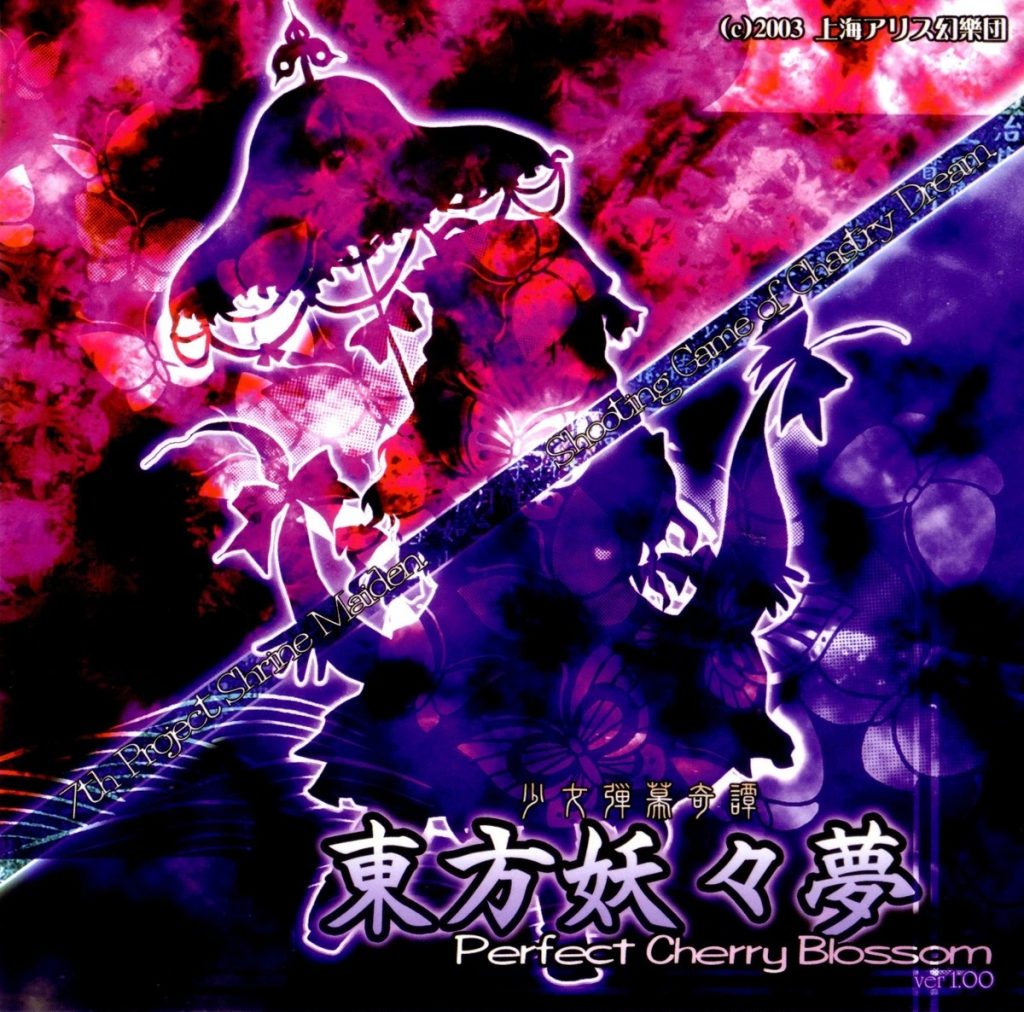
Clarste: I am sadly a Normal mode player, but I do try to 1CC all the main games. My favorite game is… well, it’s hard to choose, but probably Subterranean Animism overall. My favorite character is Sagume. Runner-ups would be someone like Yachie or Seiga or Eirin. I think I have a type. Musically, I like most Touhou remixes, but I don’t like thinking about it too much, so I tend to just look for big playlists.
Alice: I love Mountain of Faith to death, and I try to play it every autumn. My favorite character is now Aunn Komano for her enviable ability to be a helpful friend to pretty much everyone, but Suwako Moriya is a close second. I also love the fan music, especially Tokyo Active NEETs’ orchestral arrangements and xi-on’s rock arrangements. I like doodling the characters too.
Battler: PCB is the first game I 1cc’d and I still love it, but HSiFS is a close second, and FW is coming in strong. Character-wise, I think Mokou is prooobably my favorite? But I also love Miko, Aunn, and Sakuya, off the top of my head. And I’m a big fan of metal remixes, so you’ll often find me listening to Demetori, Crow’s Claw, etc.
nook: EoSD was the first game I played, and probably the one I spent the most time on trying to get a 1CC on Normal. These days, my favorite games are Mountain of Faith and Imperishable Night, and I like to play for score (on Normal) just a little. I got 2 billion points with the Netherworld team in IN! (the WR is like 4 billion points lol). As for my favorite character, well, it would be cheating to say Reimu since she’s the protagonist, so I’ll say Merry Hearn from ZUN’s CDs. Those are really great, by the way. Magical Astronomy is my favorite.
Q: What got you into translating? Aside from FMW, what other projects were you especially into?
CR: Back in the 90s, there were a ton of manga and video games that never got English releases. It drove me to want to learn to read Japanese, to bypass that language barrier. The manga series Dragon Quest: The Emblem of Erdrick was a big driver for me, and that recently came full circle when it finally got an English-language release that I received the opportunity to contribute to (Check it out if you have any interest in DQ or 90s-era shonen fantasy manga!). I’ve also been an active member of the English-speaking Super Robot Wars community for decades, in both a fan capacity and a professional capacity.
AW: While my background was actually in academic linguistics, as someone familiar with Japanese from childhood, I’ve always been translating bits and pieces of manga, fan-art, and song lyrics for friends informally, as well as tutting while watching subbed anime with them (“I’d have done it like this…”). I liked the feeling of helping people engage with something I enjoyed that they otherwise wouldn’t get to experience, but I had never really considered doing it as a job (not outside of translating obscure mediaeval texts anyway). Eventually I ended up being introduced to media translation by Christina, whom I had met through a mutual friend.
Clarste: Oops, I guess I already answered this. I took Japanese classes in college just for general anime fan reasons, but I never really used it until I decided to play another Touhou fangame, Genius of Sappheiros by Strawberry Bose, in Japanese. This forced me to brush up on my basic reading skills. Later, a friend wanted to know what happened in the Wild and Horned Hermit (one of the official manga) chapter that had his favorite character Kyouko in it. I think it was chapter 8? And since the fan translation had stalled, I figured “hey, I could probably translate that for a friend.” Later, I met Christina through the FMW translation LP project, and she introduced me to the world of professional translation.

Alice: I desperately needed a career change from my programming job and decided to take the leap to translating, which had always been a hobby, and the stars aligned. I used to work a lot on the English Touhou wiki and some of that work was on translation too. My experience getting into a Japanese-only light novel series made me want to give that experience to others too.
Battler: Weirdly, FMW itself is why I’m a translator. The full story is too long to bother with here, but working in pharmacy was a bad fit for me, so I started doing the Let’s Play of FMW4 in my spare time, and that experience made me realize that I wanted to be a translator.
nook: This is actually my first translating job. So I guess FMW is what got me into it, too. It’s kind of also what got me into learning Japanese after staring at it for so long. I find it interesting to study translations of other games (like Ace Attorney, Fire Emblem) to try and see how or why they came to be.
Q: What was your experience with FMW, personally? What are your favourite aspects of the game or anything else you especially enjoy?
CR: I came into FMW from the Super Robot Wars fandom, when a friend sent me a mission objectives screen to translate and I grew curious about what the deal with this game was. When I tried it out, I was very impressed with the quality of the game and the satisfying way the difficulty was balanced. I think my favorite thing from the game was a certain scene between Remilia and Flandre in the third arc where instead of simply narrating a dramatic moment, the developers went the extra mile by fully rendering it as a custom one-time battle animation. That amazed me—it was a portrayal that I hadn’t imagined was possible within the visual medium of a turn-based strategy RPG.
AW: I think of everyone on the team I’m by far the most new to FMW, so I got to fall in love with it during the project. SRPGs aren’t my wheelhouse, so it was fun to experience an entirely new kind of gameplay. To me, the most striking aspect of FMW was how engaging I found the story, and how the Japanese text was good at balancing amusing humour with occasional heart-touching moments. In addition to the one Christina is referencing, Marisa’s character arc in Imperishable Night remains my favourite―it was one of the first such sections I worked on and it had such unexpected emotional depth. We all worked so hard on those kinds of moments, and I hope everyone enjoys them as much as I did.
Clarste: I first played FMW back when the first game was released. At the time, I just played every Touhou fangame that looked interesting. Honestly, I didn’t understand the battle system very well, especially the SRW parts, but what I found fascinating was how it tried to integrate the spellcards into the story. Like, even the names of the spellcards were telling a story about the character. I found that really cool. Then I completely forgot about it until someone was doing a Let’s Play of the 2nd game on Something Awful, and asked for help from translators. My favorite scene would have to be the final battle with Utsuho. I was crying while translating that. Unrelated to the game itself, I feel like working on the translation project literally changed my life. The friends I made there are still my friends over a decade later, and we still meet up regularly to play online games or whatever. Even my career path has changed because of it. It wouldn’t be an exaggeration to say that deciding to work on it was one of the most important events of my life.
Battler: I was already into SRW and Touhou fangames, so I caught wind of this newfangled 幻想少女大戦 (Fantasy Maiden War) thing right away. I’ll mirror everyone else’s comments on its quality; I really do think this is one of the best strategy RPGs out there, indie or otherwise. And, well, I literally wouldn’t be on this career path without FMW, so I owe a lot to this series. Anyway, most of my favorite parts of this game are kind of spoilers, so uhh… I’ll just say the Kogasa chapter is the cutest damn thing I’ve ever seen.
nook: There’s quite simply nothing else like it. I’ll say I particularly like the relationship between Yukari and Yuyuko.
Q: Christina, from your Twitter, I see that you’ve also translated the original Super Robot Wars series. Which came first? Your interest in FMW? Or your interest in SRW? Did your interest in one also led to translating the other?

CR: My interest in SRW started in the early 2000s, so I had a longstanding background with that series before I learned about FMW. I first learned about FMW from a friend of mine within the SRW community, but aside from that, the two IPs are largely separate to me. That said, my interest in FMW did lead to me reaching out and offering assistance to a group that was collectively translating the scenario text for a Let’s Play thread on Something Awful. That group included several members who went on to work on the official translation, in fact!
My professional work on SRW happened in a completely unrelated way, but that work began while I was still on the fan project, amusingly. It was fun surprising the team with that announcement when SRW X came out in 2018.
FMW Translation
Now that we’ve learned a bit about the team, we’ll be asking a few questions on how they got the opportunity to translate Fantasy Maiden Wars.
Q: How did you become involved with the English translation of FMW? Did you reach out to the developers/publisher? Or did they reach out to you? Did they make any special requests in regards to the translation?
CR: Clarste and I have a longstanding relationship with Phoenixx, a Japanese publisher of indie games whose catalogue includes numerous Touhou derivative works. We’ve handled several such titles for them in the past, including Sunken Fossil World (an official game!), Azure Reflections, Gensou Skydrift, Mechanical Scrollery, and Genso Wanderer: Lotus Labyrinth R.

Amusingly, two things happened at once: Phoenixx reached out to me and Clarste through our usual channels for initial project inquiries, and Sanbon-san himself reached out to a different member of our previous fan translation team to explore the possibility of using the old text. Once I explained our background to our project manager at Phoenixx and reached out to members of the fan team for proper permissions, things proceeded pretty smoothly
Oversight wasn’t really an issue. The trickiest part was the sheer size of the project, a whopping 2,468,211 characters. While the fan translation was a decent starting point, it did require a lot of clean-up to bring it up to our current, more professional standards. The co-editor and I spent two years combing through the previous translation while the translation team took care of all the new text and original game text that the old fan translation had never covered.
Clarste: Sanbon-san put a lot of trust in us, because he was already aware of our fan translation and was especially impressed by our handling of the character voices (as in, the writing, not that the game has voice acting). So it was basically: “I know you get the characters, so do more of that.” Honestly, we probably could have used a little less freedom, deadline-wise. Or maybe that’s just me. I personally find it a little hard to pace myself without clear deadlines.
AW: I was brought into the project later than many others, initially for battle lines and some religious terminology. As Christina noted, there’s a huge amount of text in this game, and the sheer size meant that there was more second-drafting and editing work than any one person could handle in the time allotted, so I ended up taking on a significant portion of the story as well. I’ve been checking out Japanese thoughts on social media about the English release, and the #1 thing I see is “They did it despite that enormous amount of text?!”. It’s true… there really was a lot. I know because I read almost every single word…
Battler: idk where to even begin here, lol. This all started as a mutual friend of ours, BlitzBlast, just playing through FMW1 (after a different group made a patch for it) and talking about it in our IRC channel. I remember laughing at him getting frustrated about the RNG a lot. That eventually turned into a Let’s Play on the Something Awful forums, which he handled through the first three games, before I picked up the torch for the 4th. I started venturing into the world of translation work a bit later, eventually being brought by Christina to help with Lotus Labyrinth R. Then, like midway through that project, Sanbon-san himself contacted me on twitter to inquire about our fan translation. Needless to say, I was bouncing off the walls. That was so long ago now… man, we really did have to translate a lot of text, didn’t we?

nook: Once we agreed to ship off our fan translation to ourselves but wearing suits and fake moustaches, I asked Christina if I could be part of the new team. Graciously, she accepted! My Japanese is limited, but my familiarity with the game’s files and systems allowed me to do my work, and I really wanted to help out with the official product. I think only Christina and maybe Clarste had direct contact with Phoenixx, but Sanbon-san introduced himself to us once the project got underway. His English is incredibly good!
Q: FMW is a work that includes a great many official Touhou Project terms. However,most official Touhou Project terms don’t have official English translations. How did you deal with this fact? Did you aim to create your own original English translations? Or did you follow the English translations that are commonly used among overseas Touhou fans?
CR: Terminology’s always a tricky topic. Sometimes fan wikis have consistent names for things, and sometimes there’s no existing precedent. It’s further complicated by the fact that many of the older Windows games have a spotty translation history, and sometimes inaccurately translated lines become widely accepted by the English-speaking fandom as iconic. That said, we generally try to defer to precedent where it exists, unless there’s a compelling reason not to, or there are multiple conflicting precedents.
Clarste: “The existing translation bugs me a lot” can also be a compelling reason. That said, we went back and forth on a lot of terminology during the editing process, and every change was discussed as a group. Uh, there’s also one term where we went with what the fan wiki was using at the time, and then like a week later they changed it but we kept using it. Oops!
AW: As someone who handled or checked a lot of the Shintō and Buddhist terminology that Touhou tends to include, one thing I kept in mind was “If someone doesn’t know what this is, does the translation make it possible to look it up on Wikipedia or Google?” Xuánzàng’s 7th century principles of Buddhist terminology translation didn’t include googleability but I feel like that was an oversight on his part, because his other stuff on deference to past standards and respect for prior work was spot on.
Battler: I’m going to hijack this question to talk about something tangentially related. Some of you might already know this, but our “group” (I guess?) is called the White Jade Belvedere. That started as a discussion about inconsistencies in translation standards across the franchise. Like, “Scarlet Devil Mansion” makes sense instead of “Koumajou”, Remilia is western after all. Likewise, “Eientei” is very Japanese. But then, why “Palace of Earth Spirits” instead of “Chireiden”? Why “Muenzuka” instead of “Mound of the Nameless”? And so on.
While pondering this, suggestions on what to use instead of “Hakugyokuro” were raised, from White Jade Palace and White Jade Tower, to eventually, White Jade Belvedere. This suggestion was immediately ridiculed, cuz like… what the hell is a “belvedere”? Many years later, when we moved from IRC to Discord, we needed a name for our server, and that in-joke was still going strong, so that’s what we used. And eventually, when we haphazardly put out our own fanpatch, we needed a name for our “group”, and well… what else were we gonna call ourselves?
Anyway, FMW itself still uses all the existing standard translations, so the name has become a relic of a different time.
Clarste: I guess by some strange definition you could consider us a doujin circle? We have this running joke that anything any of us has worked on (which is a lot of things by now) is “officially” a White Jade Belvedere project.
nook: …It really is a ridiculous name.
Q: There is an unfathomable amount of character interactions and unique dialogue in FMW, were there any in particular that stuck out in any way? Were any a small or big challenge for translation? Any that you’re fond of? Feel free to be vague if you wish to avoid spoilers.
CR: From my most recent replay, the funniest scene that sticks out in my mind is a scene that plays if you bring the Aki sisters along on one of the early Perfect Cherry Blossom arc stages where it’s snowy. Challenge-wise, one of the harder things for me was spotting every reference. I noticed that Japanese players playing the currently-released Steam demo for FMW were checking to see how certain Marisa lines in battle were translated because they were quotes based on an SRW original character named Masaki Andoh. That was the first time I realized those lines were references at all—Even with my decades of SRW familiarity, I can’t spot everything…
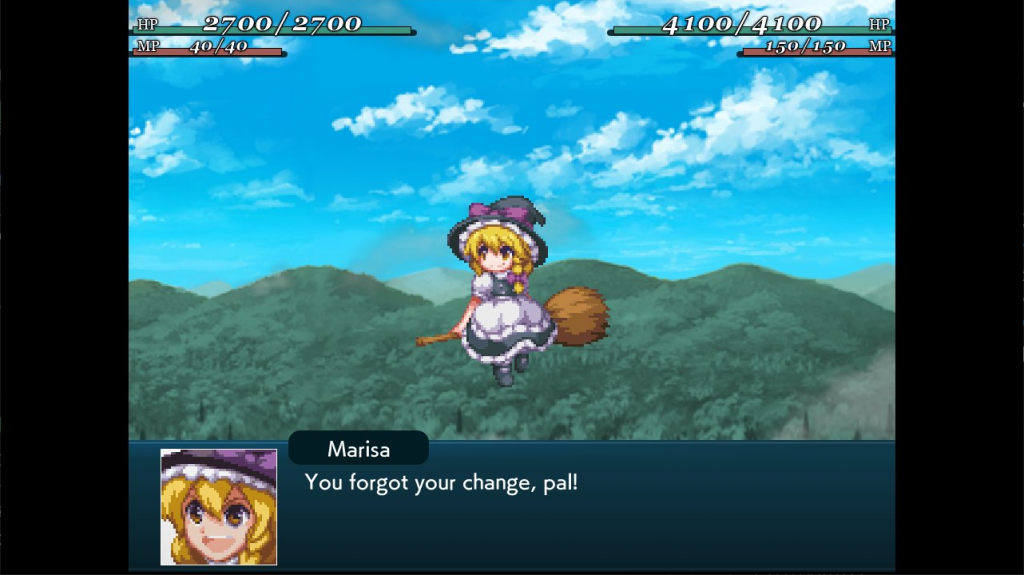
Clarste: The biggest challenge for me was definitely what we call the “boss dialogue”, ie: the little mini-conversation each boss has with each playable character when you initiate combat. There are, like, a hundred playable characters in this game, so by the end of the game that becomes a huge chunk of the dialogue in any given chapter. Even if the vast majority of it won’t be seen by any given player because they’re not using those characters. And then the Complete Box release added a New Game+ mode, where you could bring characters back to play through the entire game with, and naturally they added even more boss dialogue for that… It is actually hilarious that every single character has boss dialogue with themselves, and 99% of it will never be seen by the player. But I’ve seen it. I’ve seen all of it.
AW: Clarste’s answer is definitely the truth. There’s so many interactions that I would never have even thought to try that I’m now going to hunt down to see again in-game. There are also, as Christina notes, a huge amount of references in this game, mainly to prominent mecha shows and games, but also sometimes just odd one-off references. I wasn’t surprised to see Macross 7 references, but I still can recall my shock at seeing Mystia quoting 1960s singer-songwriter Joan Baez!
Battler: Between the music room and the Prismrivers, I have looked up SO much music terminology…
Here’s my favorite random battle line fact: If one unit is Support Defended by another unit, and the supporter gets shot down, then your unit will have a unique “revenge” line when they counterattack (I THINK you get a damage buff for this, even??). And for every established character relationship (ie Marisa and Alice), they have a unique Revenge line. Across the entire game there are several hundred of these, so if you ever see one, I hope you’ll appreciate the amount of work that went into even the smallest details.
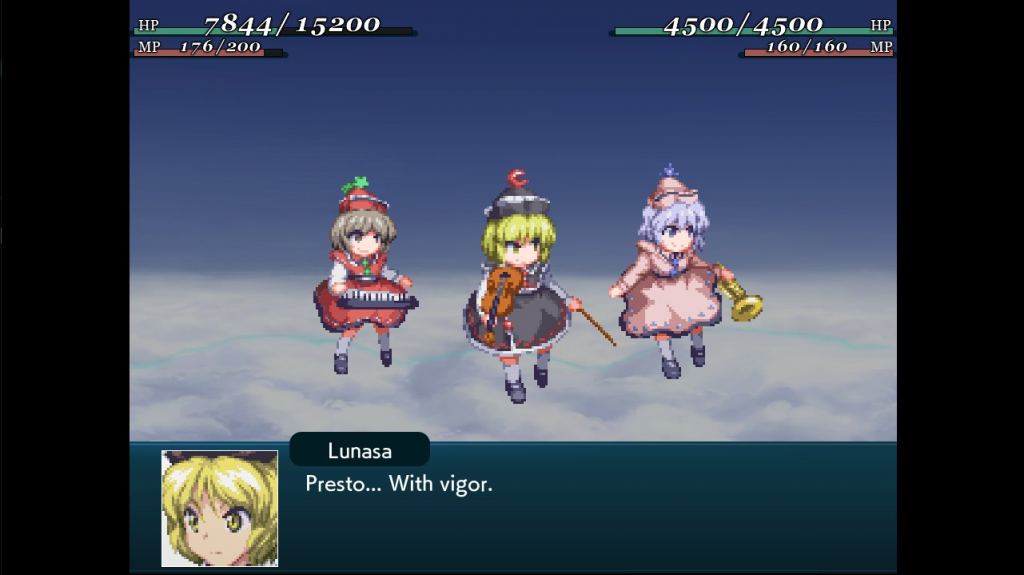
nook: The damage buff is dependent on the character, and not always related to their friendship bonus, which is an entirely different mechanic. Incidentally, Alice actually does LESS damage on her counterattack if her Hourai Doll gets shot down Support Defending her…

Closing Statements
Though we’d like to learn more details about the translation, we’re aware that it would be difficult to discuss in-depth without breaking NDAs or mentioning potential spoilers. As such, I’m afraid that is the extent of what we will be asking for this interview. Do you have any closing statements for the readers? Perhaps tips or tricks for playing Touhou/FMW or perhaps even for translating?
CR: I’ll leave the FMW tips to the rest of the team. For translating, the thing I try to remind newer translators of is that dialogue should sound fluid and natural, flowing easily from one line to the next, like banter in an English-language TV show or movie. I was very mindful of that when working on this game’s scenario dialogue, and I hope people enjoy the end result!
Clarste: My low-level gameplay tip for both the original Touhou games and FMW is to use all your resources all the time, whether that’s bombs in the shmups or SP in FMW. You’re more likely to lose by not using them then you are to lose by overusing them, so spam away. This also applies to life in general.
AW: My game tip: Support Attacks and Defends are love, Support Attacks and Defends are life. You are leaving an absurd amount of your potential on the table if you don’t abuse those. Also, you get more entertaining lines that way. We put a lot of effort into these lines, please use them! Christina’s advice for translators is spot-on, of course. My own addition would be that character voice is so important: if someone sounds like a young street tough in Japanese, they should sound like a street tough in English too, and an English speaker should be able to recognise that. Also, read your translations out loud like a stage-play! You catch so many awkward wordings that way.
Clarste: Oh yeah, definitely read them out loud. One time a fan did a live reading of something I wrote and I was like “No… Oh no…” Lesson learned.
Alice: I worked really hard on Suwako’s battle lines in particular, so I think everyone should use her! The later characters all have plenty of love put into their battle line translations (not just mine) so try using characters you get later in the game!

Battler: You ever heard the phrase “people will optimize the fun out of games”? Yeah, all my tips are completely degenerate, so I’m like the exact wrong person to ask. I guess my main one is to not underestimate Friendship Bonuses. If you equip the Personal Skills that buff them, they are truly insanely strong.
And as for translation, my advice is the same as it is for ANY writing: go to sleep, and re-read what you wrote in the morning. If it looks like an alien wrote it, you’ll know it needs touching up.
nook: For many on the team and of course everyone part of Sanbondo and Phoenixx, this game set us on a life-changing journey of well over a decade. It is infused with everyone’s Love, and I hope that Love can shine on you while playing. (You’ll get more EXP and Points next time you fight if it does)
________________________________________________________________________________
That concludes our interview with the translation team. Once again, I’d like to commend the team for their hard work in allowing the English speaking fanbase to enjoy Fantasy Maiden Wars in an official capacity. I also hope this interview has given everyone a bit of insight on what goes on in the minds of a Touhou translator and the translation process.
Fantasy Maiden Wars is now out on Steam. You can find the store page by clicking the link below.
Fantasy Maiden Wars: English Translation Team Interview End

